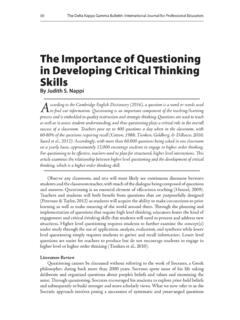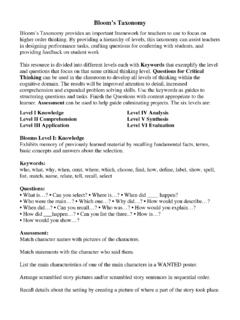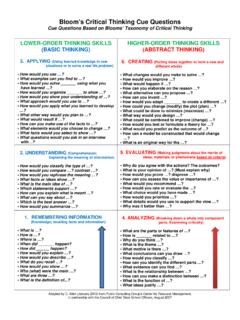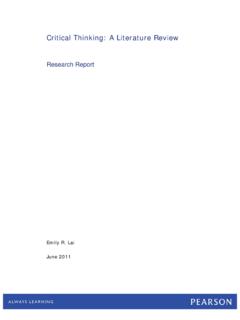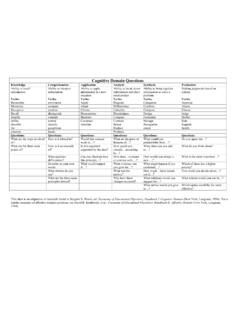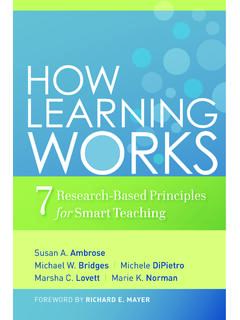S taxonomy and critical thinking
Found 9 free book(s)BLOOM’s TAXONOMY of measurable verbs
www.mjc.eduCRITICAL THINKING (MJC Courses 100-299) EVALUATION Judge SYNTHESIS Appraise Design Estimate ANALYSIS Plan Evaluate Compare Compose Revise ... BLOOM’s TAXONOMYof measurable verbs. Benjamin Bloom created a taxonomy of measurable verbs to help us describe and classify observable knowledge, skills, attitudes, behaviors and abilities. ...
The Importance of Questioning in Developing Critical ...
cpb-us-e1.wpmucdn.comBloom, Englehart, Furst, Hill, and Krathwohl (1956) developed a taxonomy that provides an important framework for teachers to use when developing questions of all levels (Figure 1). The taxonomy is represented as a pyramid with higher order thinking (cognition) at the top. The taxonomy developed by Bloom et al. (1956) classifies educational
Blooms Taxonomy questions
bloomstaxonomy.orgBloom’s Taxonomy Bloom’s Taxonomy provides an important framework for teachers to use to focus on higher order thinking. By providing a hierarchy of levels, this taxonomy can assist teachers in designing performance tasks, crafting questions for conferring with students, and providing feedback on …
Blooms Taxonomy questions
bloomstaxonomy.orgBloom’s Taxonomy Bloom’s Taxonomy provides an important framework for teachers to use to focus on higher order thinking. By providing a hierarchy of levels, this taxonomy can assist teachers in designing performance tasks, crafting questions for conferring with students, and providing feedback on student work
Bloom’s Critical Thinking Cue Questions
www.asainstitute.orgAdapted by C. Allen (January 2013) from Public Consulting Group’s Center for Resource Management, in partnership with the Council of Chief State School Officers, August 2007 . LOWER-ORDER THINKING SKILLS (BASIC THINKING) 3. APPLYING (Using learned knowledge in new . situations or to solve a real life problem) • How would you use …?
Planner’s Handbook for Operational Design
www.jcs.milArmy’s annual U.S. Code, Title 10, Future Warfare Study Plan and capstone wargame, and numerous Marine Corps seminars. The work has focused on improving commanders’ and staff’s abilities to use critical and creative thinking to help them understand the fundamental nature of a complex military problem; to design a broad
Critical thinking: A literature review
images.pearsonassessments.comcritical thinking as one of several learning and innovation skills necessary to prepare students for post-secondary education and the workforce. In addition, the newly created Common Core State Standards reflect critical thinking as a cross-disciplinary skill vital for college and employment.
Cognitive Domain Questions
teachingwithtech.lss.wisc.eduThis chart is an adaptation of materials found in Benjami S. Bloom, ed. Taxonomy of Educational Objectives, Handbook I: Cognitive Domain (New York, Longman, 1956). For a similar summary of affective domain questions, see David R. Krathwohl, et al., Taxonomy of Educational Objectives, Handbook II: Affective Domain (New York, Longman, 1964).
Research-Based Principles for Smart Teaching
firstliteracy.orgof its ideas, and I discovered new ways of thinking about teaching.” — Eugenia T. Paulus, professor of chemistry, North Hennepin Community College, and 2008 U.S. Community Colleges Professor of the Year from The Carnegie Foundation for the Advancement of Teaching and the Council for Advancement and Support of Education

